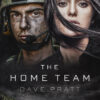Hi! I’m Kathy Ide. In addition to being a published author, I’m a full-time professional freelance editor. For CAN, I’m blogging about "PUGS"–Punctuation, Usage, Grammar, and Spelling…tips for writers based on the most common mistakes I see in the manuscripts I edit. Each blog post will have one tip for each of the four categories. (For more PUGS tips, check out my website, or get a copy of my book Polishing the PUGS (available through the website or at the conferences where I teach). If you’re interested in working with a freelance editor (or know someone who is), e-mail me through the contact page of my website. Or go to the Christian Editor Network to get referrals to other established, professional editorial freelancers. If you’re a freelance editor yourself, or think you might be interested in that field, check out The Christian PEN: Proofreaders and Editors Network.
PUNCTUATION TIP
Compound Predicates
A comma should not be used between the parts of a “compound predicate” (two or more verbs having the same subject). Example:
“Kate took Gail to a writers conference and talked her into signing up for two more.”
USAGE TIP
capital/capitol
capital (noun) can mean “wealth/accumulated possessions,” “a column,” or “a city serving as a seat of government.”
capital (adjective) means “punishable by death,” “chief in importance or influence,” “excellent,” or “not lowercased.”
“the capital importance of criticism”
“a capital book”
“spelled with a capital M”
A capitol is a building, or group of buildings, in which the functions of state government are carried out. (When capitalized, it refers to the building in which the United States Congress meets at Washington.)
“Capitol Hill” refers to the legislative branch of the United States government.
GRAMMAR TIP
Make sure that every pronoun in your manuscript has an antecedent. Example:
Amanda said she was going to the store. (She refers to Amanda.)
Exception: The pronouns it and who sometimes stand alone.
“It’s a beautiful day” or “It’s going to rain.”
“Who was at the door?”
Caution: Avoid using the stand-alone “it” as much as possible.
SPELLING TIP
air-condition (verb)
air conditioner (noun—no hyphen)
air-conditioning (noun)
air-conditioned (adjective)


